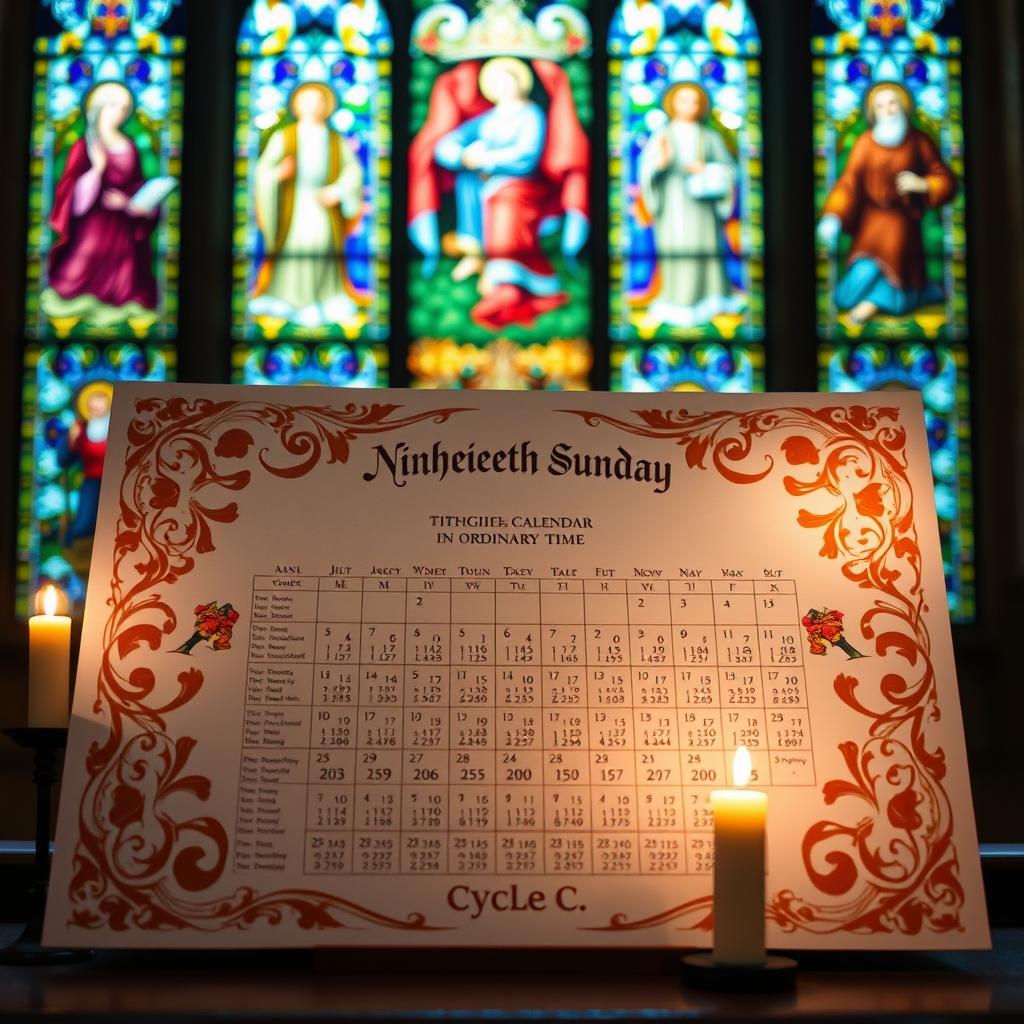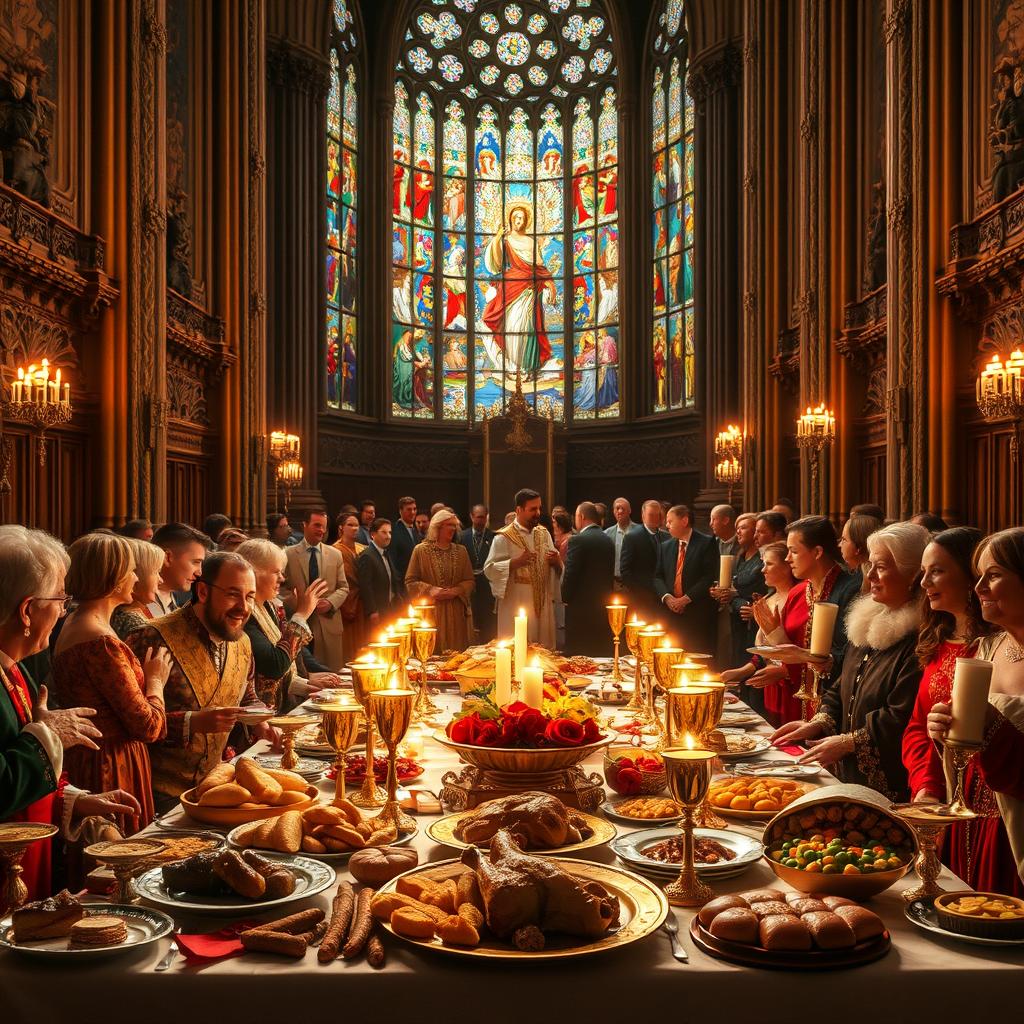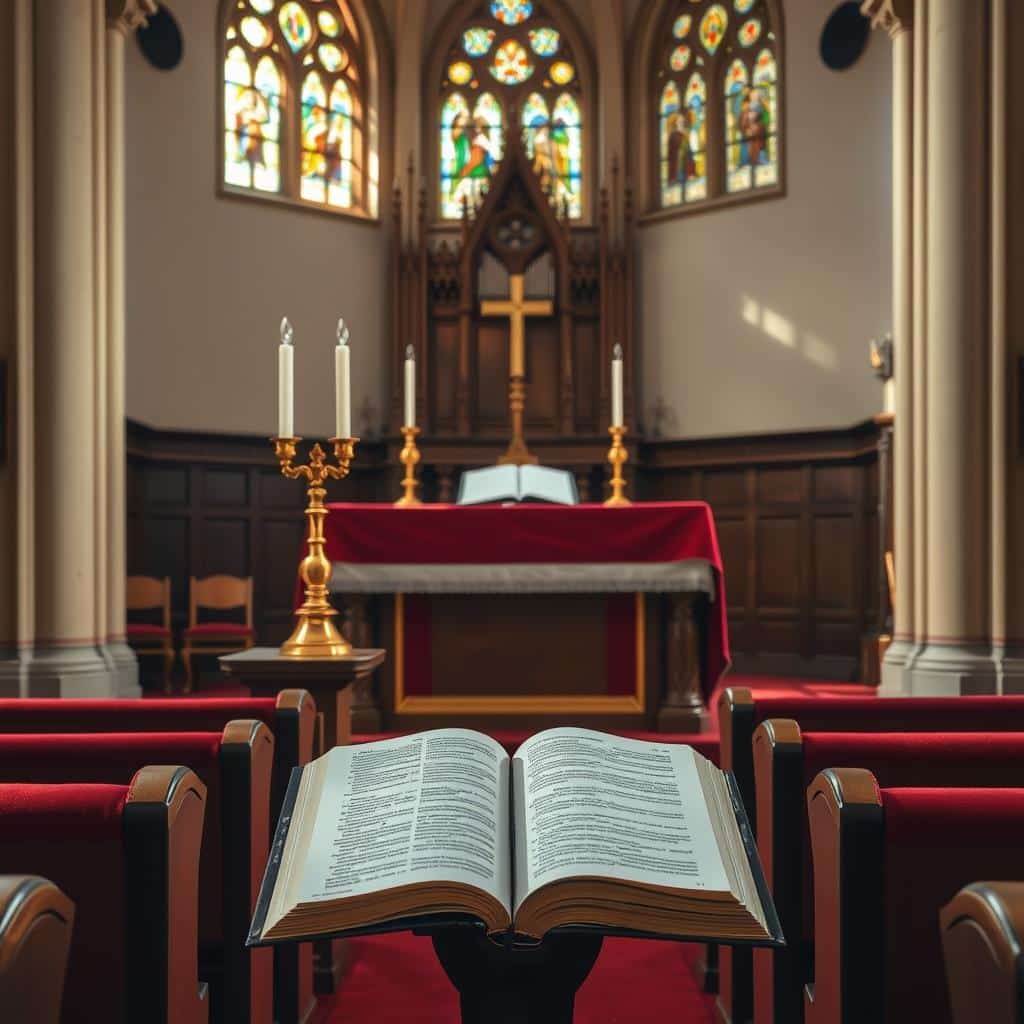As we get closer to the Nineteenth Sunday in Ordinary Time, Cycle C, we’re called to think about faith, readiness, and trusting God. The catholic liturgical calendar leads us through readings that urge us to stay true and get ready for what’s ahead.
The readings for this day are very important. The first reading, from Wisdom 18:6-9, talks about the Passover and God’s rescue. The responsorial psalm, Psalm 33, is a heartfelt thank you and praise.
The second reading, from Hebrews 11, shows us Abraham’s faith. The gospel reading, from Luke 12, tells us to be ready and faithful, believing in God’s promises.
The Liturgical Context of the Nineteenth Sunday
Understanding the nineteenth Sunday in Ordinary Time is key for meaningful worship. This Sunday focuses on Christ’s ordinary life and teachings. It offers a rich backdrop for reflecting on our faith journey.
Position in Ordinary Time
Ordinary Time is a big part of the Church’s year. It takes us through Jesus Christ’s life and teachings. The nineteenth Sunday invites us to think about faith, readiness, and trust.
The readings for this Sunday, Cycle C, are Wisdom 18:6-9, Psalm 33:1, 12, 18-19, 20-22, Hebrews 11:1-2, 8-19, and the Gospel reading, Luke 12:32-48. They show how important faith and vigilance are for believers.
Theological Focus of Cycle C
Cycle C focuses on the Gospel of Luke. It gives us a special look at Jesus‘ ministry and teachings. Luke’s Gospel talks about Jesus’ compassion, his call to follow him, and the need for prayer and watchfulness.
This cycle encourages us to dive into Luke’s story. It helps us think about our faith and what it means to be a disciple. It also invites us to live by the values of the Kingdom of God.
Preparing Our Hearts for Worship
As we get ready for worship on the nineteenth Sunday, we need to think about the themes in the readings. We should look at our faith, our readiness to follow God, and our trust in God’s care.
By understanding the liturgical context and the specific readings for this Sunday, we can grow in our faith. This helps us fully participate in the liturgy. It calls us to be watchful and faithful, as the Gospel teaches.
First Reading: Wisdom 18:6-9 – The Night of Deliverance
In Wisdom 18:6-9, we see a deep reflection on the night of deliverance. This theme is key to the Christian view of salvation. The passage talks about the Passover, showing God’s loyalty to His people.
Textual Analysis and Key Verses
The text starts by saying the night was known to our ancestors. It talks about the anticipation and preparation for this important moment in Israel’s history. It contrasts the saved Israelites with the destroyed Egyptians.
The key verse, “For the very night was made known to our fathers, that, with gladness, they might be cheered concerning the assurances they had given” (Wisdom 18:6), highlights the event’s importance as a fulfillment of God’s promises.
The author of Wisdom draws a parallel between the Passover and Christian salvation. This connection is vital for grasping the passage’s theological meaning.

The Passover Connection
The Passover is key to understanding Wisdom 18:6-9. The text clearly links to the Passover story, using its imagery and symbolism. This night of deliverance foreshadows Christian redemption through Christ.
The table below shows the Passover’s key elements and their theological themes:
| Passover Element | Theological Theme |
|---|---|
| Night of Deliverance | Salvation and Redemption |
| Passover Lamb | Sacrifice and Atonement |
| Faithfulness of God | Trust and Obedience |
God’s Faithfulness to His People
Wisdom 18:6-9 reminds us of God’s faithfulness. The night of deliverance is more than a historical event. It shows God’s lasting commitment to His covenant. This theme is central to the readings for the Nineteenth Sunday in Ordinary Time, Cycle C.
Reflecting on Wisdom 18:6-9 deepens our understanding of God’s faithfulness. It invites us to trust and obey. This passage, along with others for the day, offers a rich worship guide and homilies that inspire and challenge.
Responsorial Psalm: Psalm 33:1,12,18-19,20-22
Psalm 33 is our Responsorial Psalm for this Sunday. It invites us to think about God’s faithfulness and our trust in Him. This psalm beautifully captures the essence of our faith journey during the Nineteenth Sunday in Ordinary Time, Cycle C.
Verse-by-Verse Exploration
The psalm starts by telling us to “rejoice in the Lord” (Psalm 33:1). It sets a joyful and thankful tone. Verse 12 talks about the blessed nation whose God is the Lord, showing God’s special bond with His people.
Verses 18 and 19 talk about God watching over those who fear Him and answering their prayers. The psalm ends with a message of trust in God’s love and help (Psalm 33:20-22).

The Theme of Divine Providence
A key theme in Psalm 33 is divine providence. The psalmist says God’s care is not just for His people in the past but for everyone always. This idea is also found in the Catholic liturgical calendar, which reminds us of God’s constant presence and care.
| Theme | Psalm Verse | Reflection |
|---|---|---|
| Rejoice in the Lord | Psalm 33:1 | Cultivating joy in our faith |
| God’s Providence | Psalm 33:18-19 | Trusting in God’s care |
| Trust in the Lord | Psalm 33:20-22 | Placing our hope in God |
Praying with Psalm 33 in Daily Life
Praying with Psalm 33 in our daily lives means embracing trust and joy. We can use its verses in our prayers to show gratitude and trust in God’s care. This psalm helps us deepen our prayer life, connecting with the Catholic tradition.
Reflecting on Psalm 33 during the Nineteenth Sunday in Ordinary Time, Cycle C, invites us to trust in God’s care and rejoice in His presence.
Second Reading: Hebrews 11:1-2,8-19 – The Faith of Abraham
The Second Reading from Hebrews 11 talks about the power of faith. It shows us how faith is “evidence of things not seen.” We learn about faith through Abraham’s story, a key figure in the Bible.

Understanding Faith as “Evidence of Things Not Seen”
Faith, as explained in Hebrews 11:1, is trusting in things we can’t see. It’s about believing in God’s promises, even when we can’t see the outcome. Abraham’s faith is a great example of this.
Abraham’s story shows us what it means to trust God. When God asked him to leave his home and family, Abraham obeyed. He didn’t know where he was going, but he trusted God’s promise to make him the father of a great nation.
Abraham’s Journey of Trust
Abraham faced many challenges and uncertainties. Yet, he kept trusting in God’s promises. His story includes moments like when he was asked to sacrifice his son Isaac (Hebrews 11:17-19).
Abraham’s willingness to obey God, even when it seemed impossible, shows his deep faith. His story encourages us to think about our own faith journey and how we respond to God’s call.
Sarah’s Role in the Faith Narrative
Sarah, Abraham’s wife, also played a big role in the story of faith in Hebrews 11. She was able to conceive, even though she was too old, because she believed in God’s faithfulness (Hebrews 11:11). This shows the importance of faith in Abraham’s life and in those around him.
| Key Figures | Role in Faith Narrative |
|---|---|
| Abraham | Demonstrated trust in God’s promises through obedience. |
| Sarah | Received power to conceive due to her faith in God’s promises. |
| Isaac | Symbol of the fulfillment of God’s promise and the test of Abraham’s faith. |
Looking Forward to the Heavenly Homeland
The passage from Hebrews 11 ends by saying Abraham and others looked forward to a heavenly homeland (Hebrews 11:14-16). This encourages us to focus on God’s eternal promises, not just our earthly lives.
This view gives us hope and motivates us to live faithfully today. Abraham’s story teaches us the value of trusting in God’s promises and looking forward to their fulfillment.
Gospel Reading: Luke 12:32-48 – Watchfulness and Faithfulness
Jesus’ words in Luke 12:32-48 are a powerful reminder of faithfulness and vigilance. This passage urges us to stay committed to God. It stresses the value of treasures in heaven over material wealth.

Jesus’ Reassurance to the “Little Flock”
Jesus reassures the “little flock” that God watches over them. This message is vital for those who feel left out. It tells us our faith is not in vain and we are cared for by God.
Treasures in Heaven vs. Earthly Possessions
The Gospel reading asks us to rethink our priorities. Jesus says true security comes from treasures in heaven, not from wealth. This teaching is at the heart of Christian living, urging us to value spiritual wealth over material goods.
The Parable of the Vigilant Servants
The parable of the servants waiting for their master’s return teaches us about watchfulness. It shows faithfulness is not just sitting back but actively preparing for the Lord’s arrival. This parable encourages us to live with anticipation and readiness.
Responsibility According to Knowledge
Jesus ends by saying those who have been given much are expected to do more. This principle emphasizes the responsibility that comes with knowledge and faith. It urges believers to use their gifts and understanding to serve God and others faithfully.
Reflecting on Luke 12:32-48, we are called to deepen our faith and vigilance. We should trust in God’s providence and strive to be faithful stewards of His gifts.
Nineteenth Sunday in Ordinary Time, Cycle C: Connecting the Readings
The readings for the 19th Sunday in Ordinary Time, Cycle C, talk about trust and being careful. They guide us through the journey of faith, using stories from Israel and Christian teachings.
The Thread of Faithful Expectation
The first reading from Wisdom 18:6-9 tells the story of Israel’s escape from the Egyptians. It shows God’s faithfulness to His people through deliverance and expectation.
The responsorial psalm, Psalm 33:1,12,18-19,20-22, also talks about trusting God. It says being blessed comes from having God as our Lord, showing the power of divine care in our lives.
From Israel’s History to Christian Discipleship
The second reading from Hebrews 11:1-2,8-19 looks at Abraham’s faith. Abraham’s story teaches us about trusting God’s promises, showing us what it means to be a Christian.
The Gospel reading from Luke 12:32-48 tells us to stay alert. It compares our lives to waiting for the master’s return, stressing the need to be ready and faithful.
| Reading | Theme | Key Message |
|---|---|---|
| Wisdom 18:6-9 | Deliverance and Expectation | God’s faithfulness to His people |
| Psalm 33:1,12,18-19,20-22 | Divine Providence | Trust in God’s providence |
| Hebrews 11:1-2,8-19 | Faith of Abraham | Model of trust in God’s promises |
| Luke 12:32-48 | Vigilance and Readiness | Importance of being prepared for Christ’s return |

Reflecting on these readings, we learn about the importance of faithful expectation. This theme, found throughout the scriptures, encourages us to live with trust, vigilance, and readiness. It reminds us of the prayers and worship guides that guide our spiritual journey.
Homily Reflections and Preaching Points
The 19th Sunday in Ordinary Time, Cycle C, is a special time for us to think about our faith. The readings for this Sunday help us see how faith is important in our daily lives.
Addressing Contemporary Faith Challenges
The first reading from Wisdom 18:6-9 talks about a night of deliverance. It shows God’s faithfulness to his people. We are asked to think about how we experience deliverance and stay faithful when things get tough.
The Responsorial Psalm, Psalm 33:1, 12, 18-19, 20-22, talks about trusting in God’s care. It’s a reminder to trust God, even when we’re not sure about the future.
The second reading from Hebrews 11:1-2, 8-19, tells us about Abraham’s faith. It shows us the importance of trusting God’s promises. We are encouraged to think about our own faith journey and how we can trust like Abraham did.
The Gospel reading from Luke 12:32-48 talks about being watchful and faithful. It urges us to be ready for the Lord’s coming. It’s a call to live our faith in action.
Practical Applications for Parish Life
To make these readings meaningful in our parish, we can take a few steps:
| Reading | Theme | Practical Application |
|---|---|---|
| Wisdom 18:6-9 | Deliverance and Faithfulness | Organize a community reflection on experiences of deliverance and faithfulness. |
| Psalm 33:1, 12, 18-19, 20-22 | Divine Providence | Create a prayer chain for those seeking trust in God’s providence. |
| Hebrews 11:1-2, 8-19 | Faith of Abraham | Develop a faith-sharing group focusing on Abraham’s journey. |
| Luke 12:32-48 | Watchfulness and Faithfulness | Host a vigil or prayer service emphasizing watchfulness. |
By diving into these readings, our parish can grow in understanding and living out our faith. The liturgical calendar guides us on a journey of faith. By embracing this journey, we become more faithful and watchful followers.
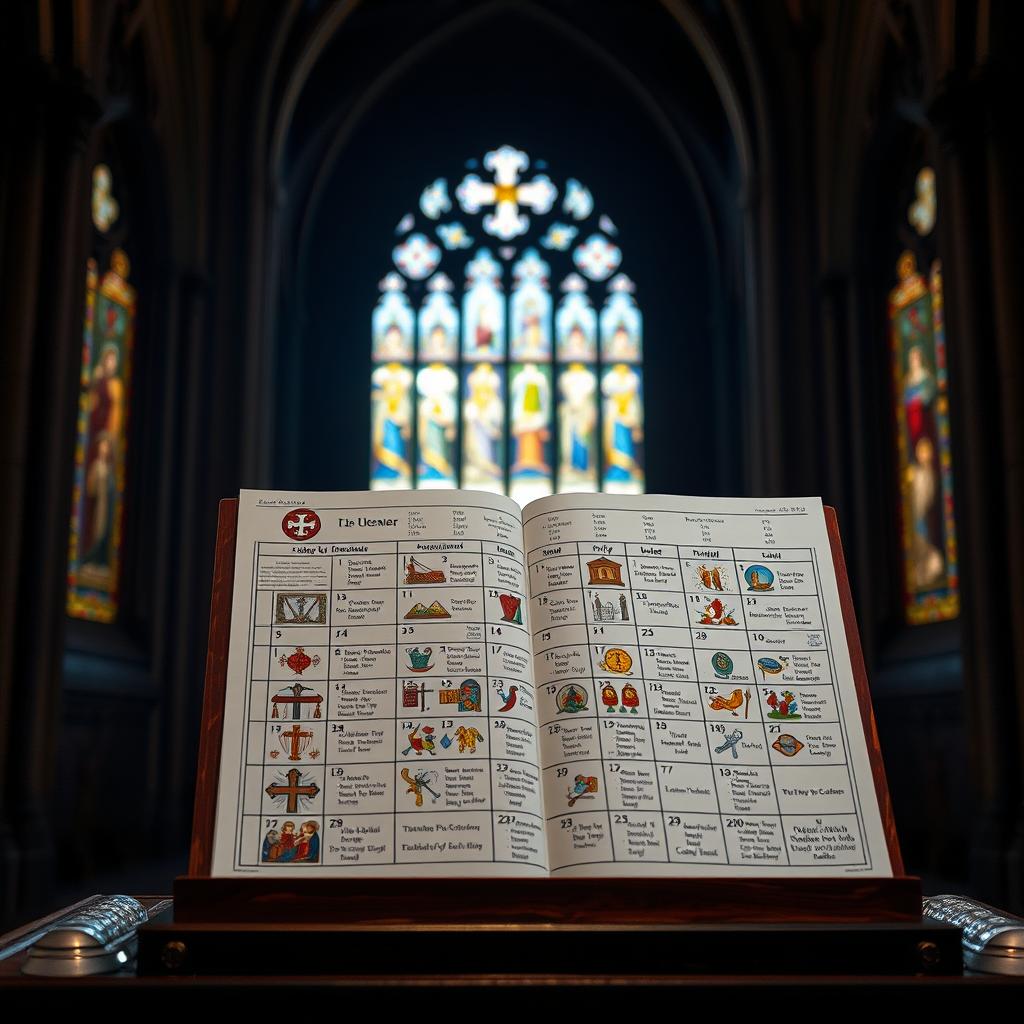
Liturgical Elements and Celebration Guide
The Nineteenth Sunday in Ordinary Time, Cycle C, brings a rich mix of liturgical elements. These elements make our worship more meaningful. As we dive into the readings, including Luke 12:32-48, we learn about staying vigilant and trusting in God’s care.
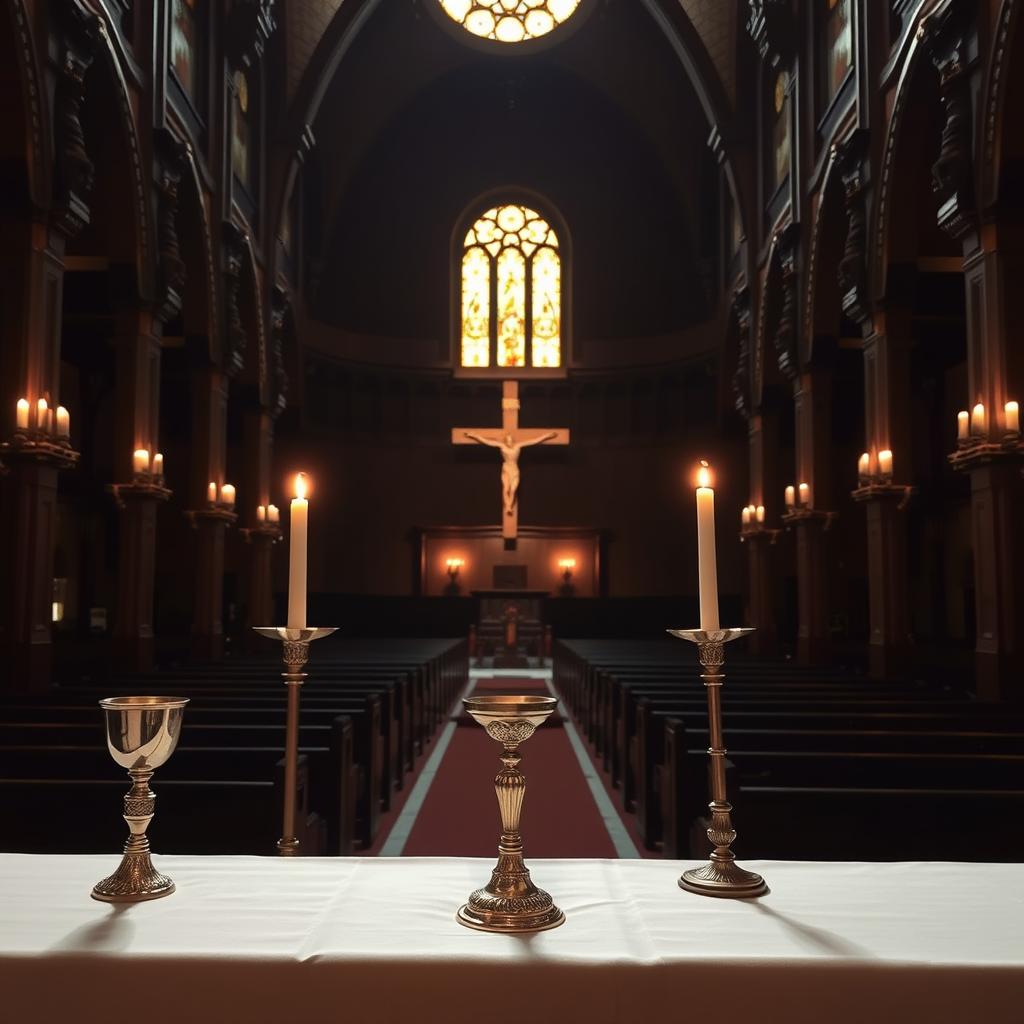
Entrance and Communion Antiphons
The entrance antiphon sets the mood for our celebration. It talks about trust and vigilance, just like the Gospel. The communion antiphon highlights the Eucharist as our spiritual food.
When we sing the entrance antiphon, we remember Psalm 33. It says, “Taste and see that the Lord is good.” This psalm, our responsorial psalm this Sunday (Psalm 33:1, 12, 18-19, 20-22), encourages us to trust in God’s faithfulness.
Recommended Hymns and Music
Choosing the right hymns and music can add to the celebration. Hymns that talk about trust, vigilance, and God’s blessings can make our worship more meaningful.
Think about hymns that show God’s faithfulness. This is seen in the first reading from Wisdom 18:6-9 and the second reading from Hebrews 11:1-2, 8-19. These hymns help us connect with the liturgy’s spirit.
Visual Environment Suggestions
The look of our worship space can also make a difference. Use liturgical vestments and decorations that match the readings’ themes. Think about symbols of vigilance and trust.
“The Lord is my light and my salvation; whom shall I fear?” (Psalm 27:1)
Creating a calm and thoughtful atmosphere helps us focus on the liturgy’s spiritual depth. By picking the right elements, we can make our worship more engaging and connect us closer to the divine.
Prayer Resources for This Sunday
Prayer is at the heart of our worship. On the 19th Sunday in Ordinary Time, Cycle C, we have many resources to help us pray. The readings for this Sunday, including Wisdom 18:6-9, Psalm 33:1,12,18-19,20-22, Hebrews 11:1-2,8-19, and Luke 12:32-48, offer a rich foundation for deepening our spiritual lives.
Opening Prayer Options
Starting our worship service with a meaningful opening prayer sets the tone. For the 19th Sunday in Ordinary Time, Cycle C, we can draw inspiration from the day’s readings. We can craft an opening prayer that acknowledges God’s faithfulness and our call to watchfulness.
For example, we might pray: “Lord, you have been our refuge through the ages. Help us to trust in your faithfulness as we journey through life, and may our hearts be ever vigilant, awaiting your return.”
Prayers of the Faithful Templates
The Prayers of the Faithful give us a chance to intercede for the world and the Church. Using the themes from the Sunday’s readings, we can create prayers that reflect our concerns and hopes.
A sample template might include intentions such as: “For the persecuted Church, that they may remain steadfast in their faith.” or “For those who are facing trials and tribulations, that they may find comfort in God’s presence.”
Meditation Prayers on Watchfulness
The Gospel reading from Luke 12:32-48 talks about the importance of watchfulness and being prepared for the Lord’s return. Meditation prayers can help us reflect on our own vigilance and faithfulness.
One might meditate with a prayer such as: “Help us, Lord, to be like the servants who wait faithfully for their master’s return, that we may be found ready when you come.”
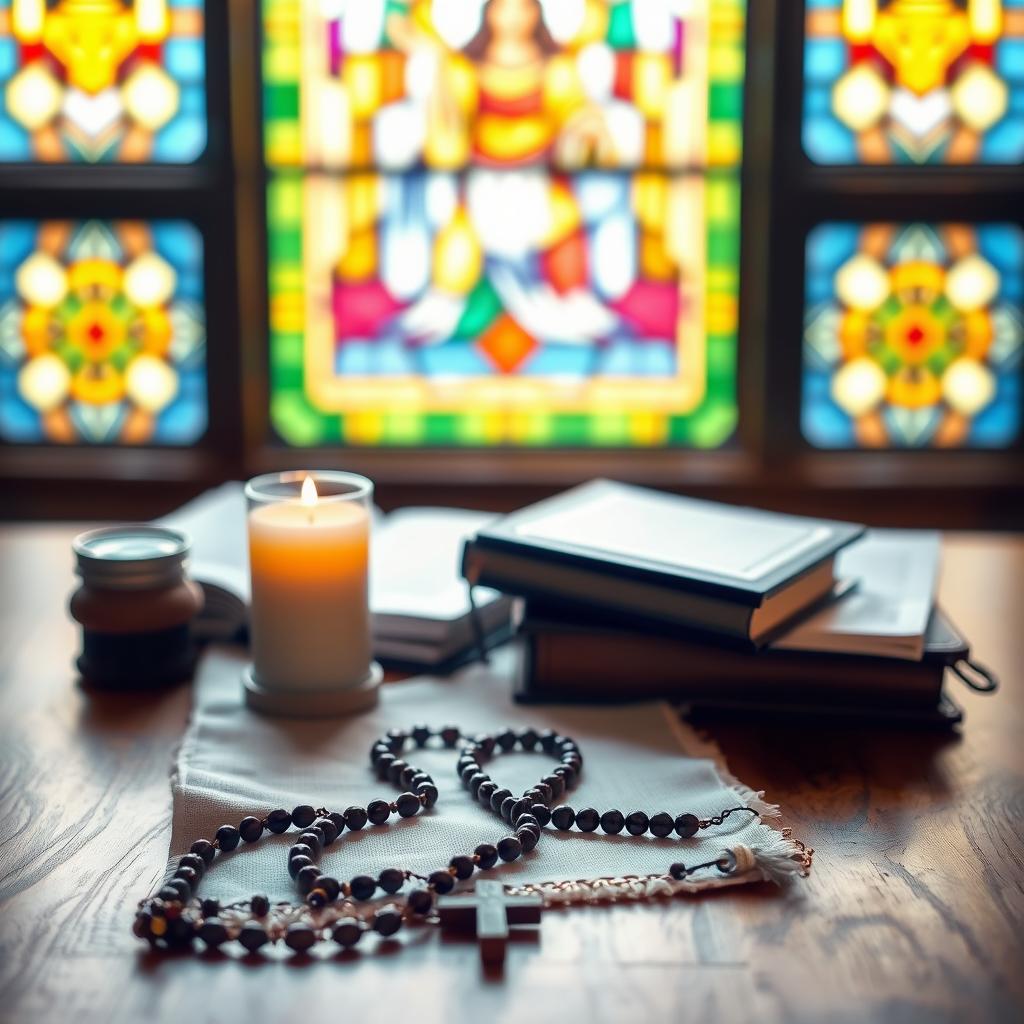
Faith Formation Activities
Faith formation is key to our spiritual growth. The readings for the 19th Sunday in Ordinary Time, Cycle C, offer a great chance to explore. These activities help people of all ages understand God’s role in our lives.
Children’s Liturgy of the Word Ideas
The story of Abraham’s faith (Hebrews 11:1-2, 8-19) is powerful for kids. Activity: Make a timeline of Abraham’s journey. Highlight moments where he showed faith. This helps kids learn to trust God.
Discussion Points: What is faith? How did Abraham trust God when it was hard? How can we trust God today?
Teen Discussion Guides
Teens can explore watchfulness in the Gospel reading (Luke 12:32-48). Discussion Guide: Talk about times when they felt watched over. How does Jesus’ teaching on being ready for the Lord’s coming relate to their experiences?
Reflection Points: What makes it hard to be watchful every day? How do we prepare for the future while living in the present?
Adult Faith Sharing Questions
Adults can dive into faith as “evidence of things not seen” (Hebrews 11:1). Faith Sharing: Start with this verse to talk about faith in our lives. How do we see God’s faithfulness, even when we can’t see the outcome?
Sharing Points: Think of a time when your faith was tested. How did you find strength in God? What role does faith play in your daily choices?
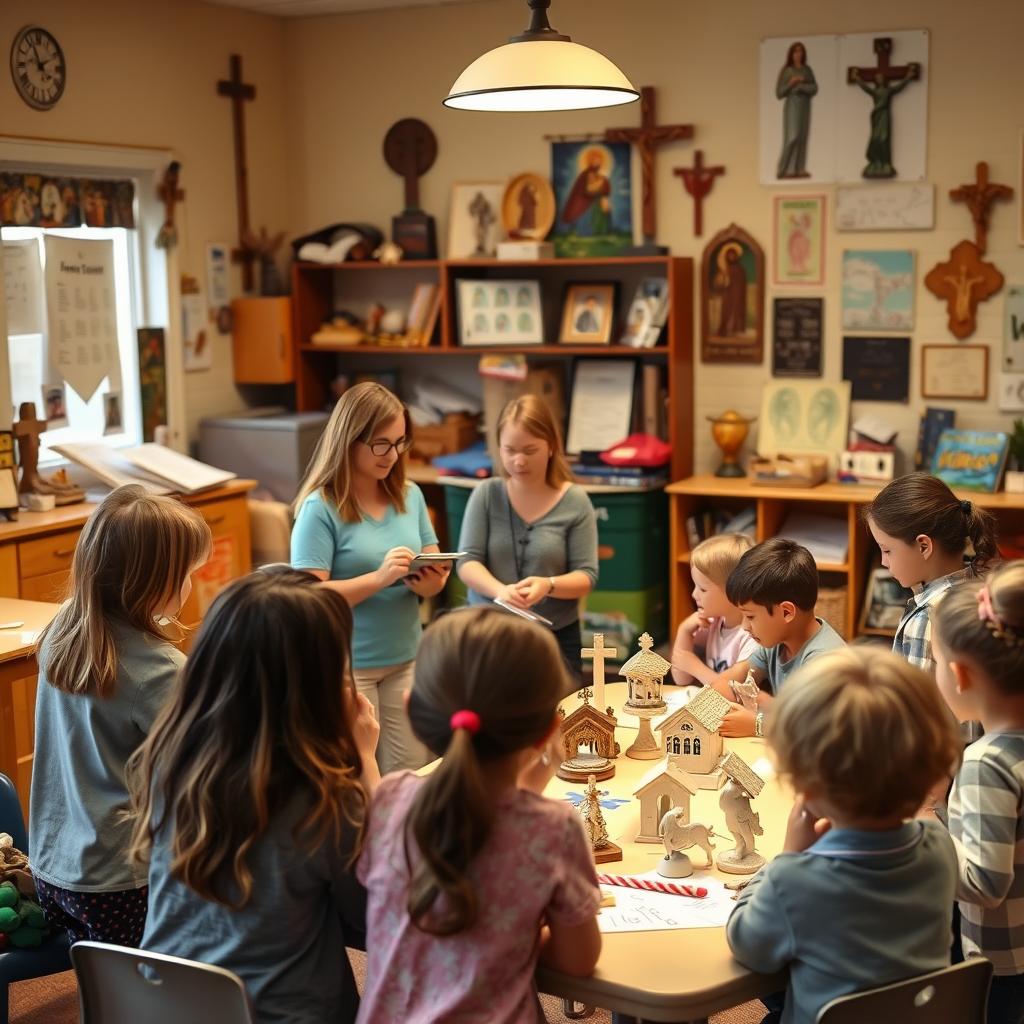
Historical and Cultural Background of the Texts
Knowing the cultural setting of the scriptures for this Sunday helps us appreciate them more. The readings for the 19th Sunday in Ordinary Time, Cycle C, have deep roots in history and culture. These roots are key to understanding the liturgical celebrations fully.

The Wisdom Literature Context
The first reading from Wisdom 18:6-9 comes from the Wisdom literature. This genre emerged in the ancient Near East, focusing on a virtuous life. It tells the story of God’s faithfulness to his people during a night of deliverance.
This context sheds light on the theological themes of the time. It shows the value of faith and trust in God’s care.
The inclusion of Wisdom literature in the liturgical calendar links the Old and New Testaments. It shows how early Christians saw Jesus through Jewish scripture and tradition.
First-Century Palestinian Household Practices
The gospel reading from Luke 12:32-48 addresses the realities of first-century Palestinian households. Jesus talks about being watchful and faithful, reflecting life under Roman rule. The parable of the vigilant servants stresses the need for readiness and responsibility.
Learning about these practices gives us a peek into the lives of those around Jesus. It makes his teachings more relevant and relatable today.
Early Christian Understanding of Vigilance
The early Christian community saw vigilance as a fundamental part of their faith. This reflects Jesus’ teachings on being ready and watchful. The second reading from Hebrews 11:1-2, 8-19 talks about Abraham’s faith and his hope for a heavenly home.
This understanding of vigilance calls on today’s believers to think about their faithfulness and readiness. It encourages a deeper commitment to their spiritual journey.
Saints Who Exemplified Faithful Vigilance
The lives of saints around the Nineteenth Sunday in Ordinary Time, Cycle C, show us what faithful vigilance means. We learn from Wisdom 18:6-9, Psalm 33:1, 12, 18-19, 20-22, Hebrews 11:1-2, 8-19, and Luke 12:32-48. These readings remind us of saints who lived this virtue.
Saints Commemorated Near This Sunday
Many saints are remembered around this time for their faithful vigilance. For example, St. Jane Frances de Chantal is celebrated on August 12. She was known for her spiritual journey and founding the Order of the Visitation of Holy Mary.
St. Maximilian Kolbe (August 14) also showed great faithfulness, even when facing persecution. Their stories teach us the value of staying vigilant in our faith.
| Saint | Feast Day | Example of Vigilance |
|---|---|---|
| St. Jane Frances de Chantal | August 12 | Founding the Order of the Visitation of Holy Mary |
| St. Maximilian Kolbe | August 14 | Enduring persecution with faith |
| St. Lawrence | August 10 | Courageous martyrdom |
Modern Witnesses to Expectant Faith
Today, we also find modern witnesses who inspire us with their faith. People like Mother Teresa and Martin Luther King Jr. worked tirelessly for justice and compassion.
These modern heroes show us that faithful vigilance is not just for the past. It’s a living part of being a Christian today. Their examples encourage us to deepen our commitment to faith.
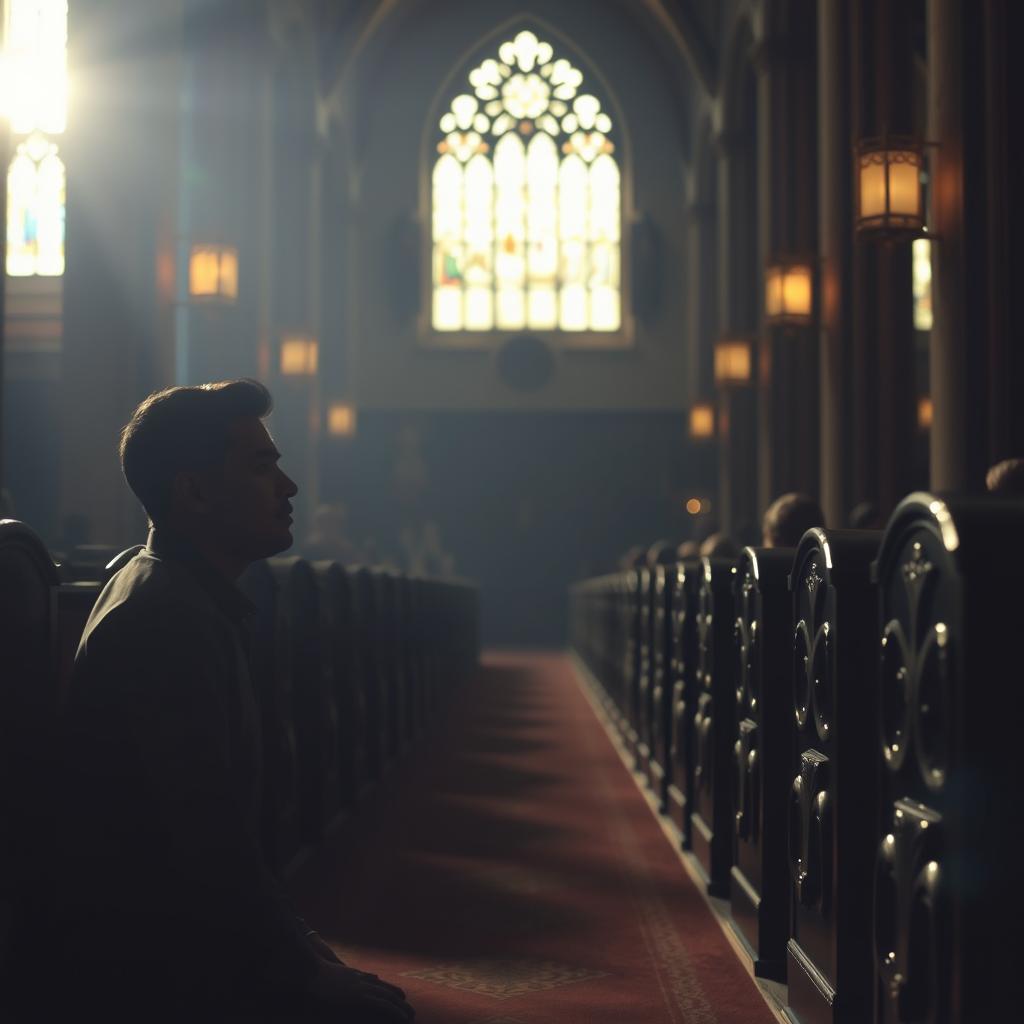
Let’s be inspired by both the saints of the past and today’s witnesses. We should all strive to live with faithful vigilance in our lives.
Carrying the Message Through the Week Ahead
As we move forward from the 19th Sunday in Ordinary Time, Cycle C, the readings continue to resonate in our hearts. The homilies and worship guide provided a rich foundation for understanding the scriptures. They emphasized themes of faith, readiness, and trust in God.
Reflecting on Wisdom 18:6-9, we recall the night of deliverance, a powerful reminder of God’s faithfulness. The Responsorial Psalm, Psalm 33:1,12,18-19,20-22, echoes this theme, highlighting divine providence. In Hebrews 11:1-2,8-19, the faith of Abraham is celebrated, demonstrating trust in God’s promises. The Gospel reading from Luke 12:32-48 urges us to be vigilant and faithful, prepared for the Lord’s return.
These readings offer a meaningful framework for our week ahead. As we integrate the homilies and worship guide into our daily reflection, we deepen our understanding of these scriptures. Let us continue to pray and reflect on the message of the 19th Sunday. This will guide us toward a more faithful and watchful discipleship.
Escape the Cycle of Reincarnation: Your Guide
